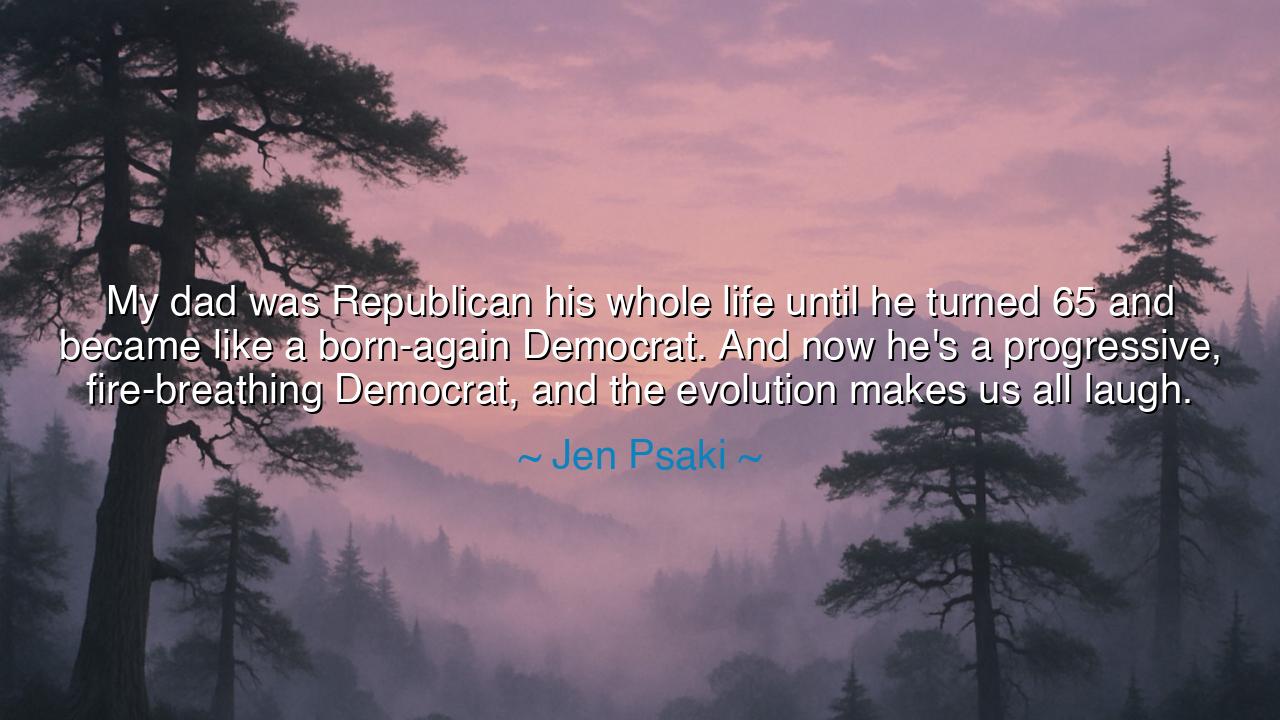
My dad was Republican his whole life until he turned 65 and
My dad was Republican his whole life until he turned 65 and became like a born-again Democrat. And now he's a progressive, fire-breathing Democrat, and the evolution makes us all laugh.






“My dad was Republican his whole life until he turned 65 and became like a born-again Democrat. And now he's a progressive, fire-breathing Democrat, and the evolution makes us all laugh.” — Jen Psaki.
In these lighthearted yet revealing words, Jen Psaki, the communicator and public servant, unveils not merely a family anecdote but a truth as ancient as humanity itself — that the mind and spirit are never fixed, and that change is the quiet proof of life. Her father’s transformation, from one end of the political spectrum to the other, is not a tale of contradiction but of evolution, the sacred process through which the heart grows wiser and the soul learns compassion through time and experience. It is a reminder that the human being is not a stone but a river — ever moving, reshaping its banks as it flows through the landscape of years.
The origin of this quote lies in a conversation about Psaki’s family background, shared with humor and affection. Yet behind the laughter, there rests a profound observation: that beliefs shift as life deepens. Her father’s youthful conservatism reflected one stage of his understanding — a trust in tradition, order, and independence. But as age brought him closer to the fragility of life, perhaps as he witnessed suffering, change, or the needs of others, his heart widened. What was once ideology became empathy. His “rebirth” into a passionate progressive reflects a truth Plato himself would have recognized — that wisdom begins when the mind dares to question what it once held certain.
This story of transformation mirrors the journeys of countless souls throughout history. Consider Saint Paul, once the fiercest persecutor of early Christians, who became the faith’s most ardent defender after his vision on the road to Damascus. Or think of Malcolm X, who began with a message of anger and separation but evolved, through experience and pilgrimage, into a prophet of unity and shared humanity. Such transformations are not betrayals of identity — they are fulfillments of it. They reveal that to live is to change, and to change wisely is to grow closer to truth.
In Psaki’s telling, the “fire-breathing Democrat” that her father becomes is not a caricature of extremism, but an emblem of passion rediscovered. For the fire that burns in the aged heart is not the flame of rebellion, but the light of understanding rekindled. Having walked the long path of life, he now sees with compassion what once he saw with distance. It is the paradox of wisdom: that the more one sees, the less one condemns, and the more fiercely one defends the dignity of others. In the laughter of the family at his transformation, we hear not mockery but love — for they recognize that he has become more human, more alive, more himself.
This evolution also speaks to a universal truth: that time is the great teacher, and empathy its finest lesson. Youth often clings to certainties; age reveals complexity. The person who cannot change has ceased to listen, and one who ceases to listen has ceased to live. Psaki’s father reminds us that even the most steadfast minds can open again — that the heart, when humbled by the years, may finally embrace the humanity it once held at arm’s length. His story is a call to remain curious, to question our assumptions, and to welcome the renewal of thought as a sign of strength, not weakness.
We might also recall Abraham Lincoln, who began his career as a cautious moderate, yet through the fires of the Civil War, became a visionary of freedom and equality. His greatness did not lie in his constancy, but in his capacity to evolve — to let suffering and experience forge deeper conviction. So it is with Psaki’s father, and with all who allow wisdom to reshape them: the willingness to transform is itself an act of moral courage.
So let this be the lesson drawn from her words: Do not fear the change of heart — revere it. To evolve is not to betray the past, but to fulfill its promise. Laugh at the journey, yes, as Psaki does, for humor keeps humility alive. But honor it, too, for it is the path of all growing souls. If age softens our edges and expands our compassion, let it do so gladly. If life invites us to question what we once defended, let us not resist the invitation. For the soul that refuses to evolve will wither, but the one that welcomes change will burn bright until its final breath.
Thus, remember the wisdom hidden in Psaki’s laughter: the human spirit is not meant to remain as it was — it is meant to bloom. And whether one becomes a “fire-breathing” advocate of new truths or a quiet witness to them, the transformation itself is sacred. For to live without changing is to have never truly lived at all.






AAdministratorAdministrator
Welcome, honored guests. Please leave a comment, we will respond soon